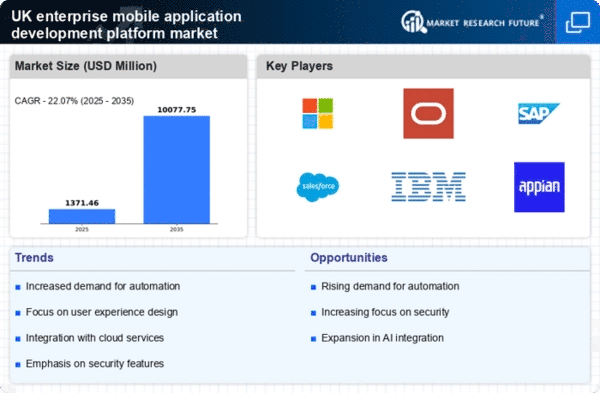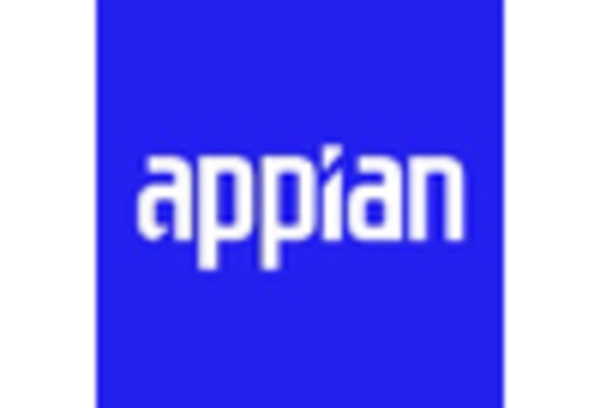Growing Adoption of BYOD Policies
The enterprise mobile-application-development-platform market is significantly influenced by the growing adoption of Bring Your Own Device (BYOD) policies among UK businesses. This trend allows employees to use personal devices for work purposes, thereby increasing the demand for secure and efficient mobile applications. As of November 2025, it is estimated that over 60% of UK organisations have implemented BYOD strategies, which necessitate robust mobile application development platforms to ensure data security and compliance. Consequently, this driver is pushing enterprises to invest in platforms that facilitate seamless integration of personal devices while maintaining corporate security standards. The emphasis on BYOD is likely to shape the future landscape of the enterprise mobile-application-development-platform market, as companies strive to balance flexibility with security.
Emphasis on Enhanced User Experience
The enterprise mobile-application-development-platform market is witnessing a pronounced emphasis on enhancing user experience (UX) as businesses aim to improve customer satisfaction and retention. In the UK, organisations are increasingly recognising that a superior UX can lead to higher engagement rates and, ultimately, increased revenue. Recent studies suggest that applications with intuitive interfaces and seamless navigation can boost user retention by up to 40%. This growing awareness is prompting enterprises to invest in advanced mobile application development platforms that prioritise UX design. As a result, the market is likely to evolve, with providers focusing on tools that enable developers to create user-friendly applications that cater to the specific needs of their target audiences.
Increased Demand for Mobile Solutions
The enterprise mobile-application-development-platform market experiences heightened demand as businesses increasingly seek mobile solutions to enhance operational efficiency. In the UK, mobile applications are becoming essential tools for improving customer engagement and streamlining internal processes. According to recent data, approximately 70% of UK enterprises are investing in mobile application development to meet the evolving needs of their workforce and clientele. This trend indicates a robust growth trajectory for the market, as companies recognize the necessity of mobile platforms in maintaining competitiveness. The shift towards mobile-first strategies is likely to drive innovation within the enterprise mobile-application-development-platform market, compelling providers to enhance their offerings and cater to diverse business requirements.
Integration of Artificial Intelligence
The integration of Artificial Intelligence (AI) into mobile applications is emerging as a pivotal driver for the enterprise mobile-application-development-platform market. In the UK, businesses are increasingly leveraging AI to enhance functionality and provide personalised experiences for users. As of November 2025, it is estimated that around 50% of new mobile applications developed in the UK incorporate AI technologies, which can improve decision-making processes and automate routine tasks. This trend indicates a shift towards more intelligent applications that can adapt to user behaviours and preferences. Consequently, the demand for enterprise mobile-application-development-platforms that support AI integration is likely to rise, compelling developers to innovate and offer advanced features that align with this technological advancement.
Regulatory Compliance and Data Protection
The enterprise mobile-application-development-platform market is significantly shaped by the increasing focus on regulatory compliance and data protection in the UK. With stringent regulations such as the General Data Protection Regulation (GDPR) in place, businesses are compelled to ensure that their mobile applications adhere to legal standards. As of November 2025, it is estimated that compliance-related investments in mobile application development have surged by 30% among UK enterprises. This heightened focus on data protection is driving the demand for platforms that offer robust security features and compliance tools. As a result, the enterprise mobile-application-development-platform market is likely to see a shift towards solutions that not only facilitate application development but also ensure adherence to regulatory requirements, thereby enhancing trust and reliability among users.
















